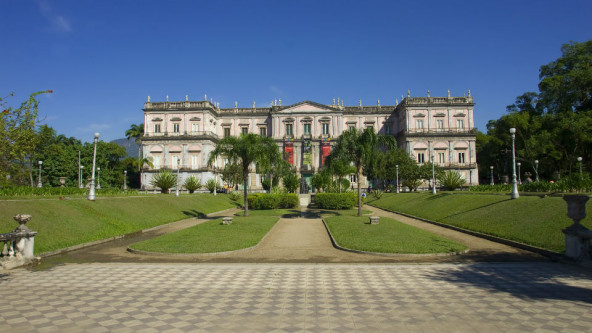 A 2018 fire at the National Museum in Rio de Janeiro accelerated efforts to improve philanthropic endowment funds in Brazil. (Photo by iStock/celsopupo.)
A 2018 fire at the National Museum in Rio de Janeiro accelerated efforts to improve philanthropic endowment funds in Brazil. (Photo by iStock/celsopupo.)
The election of right-wing firebrand Jair Bolsonaro as Brazil's president last year shocked the world as yet another populist politician tapped into a nation's deep-seated divisions and the public's mistrust of elites to win an election. Given Bolsonaro’s past statements, many people had real concerns about what his victory might mean for Brazil's environmental protections and civil society freedoms.
Amidst all the political turmoil and worries, a good-news story may have been missed. On January 4, 2019, Brazil's government passed Law No. 13,800. This introduces, for the first time in the nation, a framework to govern the creation and management of philanthropic endowment funds. It includes rules around the governance and transparency of these new structures to ensure that they are used in the right way and can command public trust. Funds focused on topics of public interest—such as education, science, health, or the environment— now fall under the jurisdiction of Law No. 13,800, with the aim of using the funds in a more stable and transparent manner. However, endowments that target cultural institutions, which receive special consideration in the new law, enjoy additional benefits, including tax breaks on donations.
It has long been possible to create endowments in Brazil, but without proper legal structures and regulatory controls, the process proved problematic and damaging to public trust of the nation's philanthropic sector. For example, no rules existed to prevent funds from being spent on activities unrelated to an organization's mission. The results were unsurprising; there was widespread suspicion that wealthy families, board members, or executives would use endowments for personal gain. Other times, funds of public interest were mismanaged, leading to unexpected liabilities. Numerous corruption scandals in the country’s wider NGO sector have also undermined trust in the nation's philanthropic community, particularly when the transgressions, which included money laundering, involved suspicious government contracts or funding. Why? Brazilians already deeply distrust their government—the nation ranked toward the bottom of the 2019 Edelman Trust Barometer—so NGOs that work with the state may become guilty by association.
The new law attempts to solve some of these problems. Endowment funds will be established as separate entities and governed by more stringent rules than ever before, with specific rules to limit spending on anything unrelated to the mission.
Are you enjoying this article? Read more like this, plus SSIR's full archive of content, when you subscribe.
Given the importance of endowed giving in the growth of philanthropy in many countries, bolstering it should provide a major boost to Brazil's culture of giving. Granted, the new legislation is not perfect and it will not single-handedly improve Brazilians' trust in philanthropy. For example, some people were disappointed that tax relief on donations is currently restricted to endowments linked to cultural causes. But the law, even if imperfect, could pave the way for the future development of philanthropy that leads to more ongoing and sustainable support for NGOs and civil society organizations.
The law is the result of years of unseen work by many actors, including the Charities Aid Foundation's Brazilian partner, the Institute for the Development of Social Investment (IDIS). IDIS led the creation of a coalition of non-profits that strongly advocated for an endowment law like 13,800.
The creation of Law No. 13,800 sped forward when a fire struck the National Museum in Rio de Janeiro in 2018, destroying countless Brazilian artefacts and works of art. In response, lawmakers passed a temporary measure that allowed for the creation of endowments for the purpose of helping cultural institutions recover from a tragedy.
The measure eventually transformed into the permanent Law No. 13,800, demonstrating the value of our persistent advocacy. It also surprised us: It is easy to assume that governments embroiled in political matters—such as Brexit in the United Kingdom, government shutdowns in the United States, or a cultural disaster in Brazil—have no bandwidth for anything else. But perhaps turbulent times are exactly when we should more passionately advocate the role of endowed philanthropy. After all, one of its strengths is to take a longer-term view of issues and stand outside the short-term cycles of politics and the market. It can play a critical role in finding solutions to the huge challenges of our era—from climate change to growing inequality—that governments are unwilling or unable to respond to.
Amid our celebrations of the new legislation in Brazil, we also need to acknowledge that it comes at a time when philanthropy is facing deep scrutiny and even questions about its legitimacy. Recent books, such as Anand Giridharadas’ Winners Take All and Rob Reich’s Just Giving, have raised important questions. Does elite philanthropy promote market-based “win-win” solutions at the expense of seeking the fundamental structural reforms that are needed to address global inequality? Does philanthropy threaten democracy by allowing an elite minority to sway public debate and policy through their giving?
Many in the philanthropy sector have heeded these criticisms. And if Brazil responds to them correctly—if it uses the critiques to build a stronger culture of giving atop its new foundation of endowment-building freedoms—then the country could serve as a template for philanthropic reforms around the globe.
It is needed now more than ever. Democracies are struggling to retain their vitality, and governments are failing to respond adequately to climate change, inequality, and other serious threats. Philanthropy has huge positive potential to take on these problems, but only if done right. Brazil has a chance to show the world how.
Support SSIR’s coverage of cross-sector solutions to global challenges.
Help us further the reach of innovative ideas. Donate today.
Read more stories by Paula Fabiani & Rhodri Davies.

